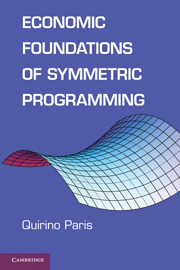Book contents
- Frontmatter
- Contents
- Foreword
- Preface
- 1 Introduction
- 2 Lagrangean Theory
- 3 Karush-Kuhn-Tucker Theory
- 4 Solving Systems of Linear Equations
- 5 Asymmetric and Symmetric Quadratic Programming
- 6 Linear Complementarity Problem
- 7 The Price Taker
- 8 The Monopolist
- 9 The Monopsonist
- 10 Risk Programming
- 11 Comparative Statics and Parametric Programming
- 12 General Market Equilibrium
- 13 Two-Person Zero- and Non-Zero-Sum Games
- 14 Positive Mathematical Programming
- 15 Multiple Optimal Solutions
- 16 Lemke Complementary Pivot Algorithm User Manual
- 17 Lemke Fortran 77 Program
- Index
15 - Multiple Optimal Solutions
Published online by Cambridge University Press: 05 June 2012
- Frontmatter
- Contents
- Foreword
- Preface
- 1 Introduction
- 2 Lagrangean Theory
- 3 Karush-Kuhn-Tucker Theory
- 4 Solving Systems of Linear Equations
- 5 Asymmetric and Symmetric Quadratic Programming
- 6 Linear Complementarity Problem
- 7 The Price Taker
- 8 The Monopolist
- 9 The Monopsonist
- 10 Risk Programming
- 11 Comparative Statics and Parametric Programming
- 12 General Market Equilibrium
- 13 Two-Person Zero- and Non-Zero-Sum Games
- 14 Positive Mathematical Programming
- 15 Multiple Optimal Solutions
- 16 Lemke Complementary Pivot Algorithm User Manual
- 17 Lemke Fortran 77 Program
- Index
Summary
A large majority of empirical studies using either an LP or a QP specification has neglected the consequences of one important aspect of mathematical programming. Simply stated, the polyhedral nature of the solution set in LP and QP models may be responsible for multiple optimal solutions, if some plausible conditions are realized. If and when an empirical problem possesses alternative optimal solutions, why is only one of them usually selected for presentation in final reports which, often, make efficiency judgements and prescribe significant policy changes? In this chapter, we discuss, separately, the existence, the computation, and the consequences of multiple optimal solutions (MOS)in linear programming and in quadratic programming models.
MOS in Linear Programming
When LP is used for analyzing empirical problems, an explicit comparison is usually made between the activities actually chosen and operated by the economic agent under scrutiny and the optimal level of activities suggested by the model's solution. In some instance (Wicks), the use of LP for policy planning has inspired the use of Theil's U-inequality coefficient to assess formally the discrepancy between actual and optimal (predicted) activities. Desired values of the U coefficient are those close to zero, attained when the squared distance between actual and LP optimally predicted activities is small. Implicitly, minimum distance criteria have been used by many authors to assess the plausibility and performance of their LP models. In the presence of multiple optimal solutions, however, the selection of a specific solution for final analysis is crucial and should not be left to computer codes, as probably has been the case in all reported studies.
- Type
- Chapter
- Information
- Economic Foundations of Symmetric Programming , pp. 412 - 438Publisher: Cambridge University PressPrint publication year: 2010



